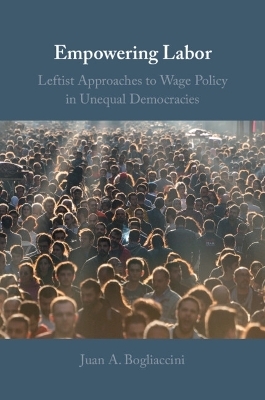
Empowering Labor
Leftist Approaches to Wage Policy in Unequal Democracies
Seiten
2024
Cambridge University Press (Verlag)
978-1-009-43350-1 (ISBN)
Cambridge University Press (Verlag)
978-1-009-43350-1 (ISBN)
A comparative study of Chile, Portugal, and Uruguay that analyzes the underlying dynamics shaping the use of wage policy as a pre-distributive instrument of leftist parties. Focuses on large-scale political practices that (de)legitimize labor as a political actor, enabling or disabling social dialogue for social cohesion and political inclusion.
Empowering Labor uses a comparative study of Chile, Portugal, and Uruguay to analyze the underlying political dynamics that shape the use of wage policy as a pre-distributive instrument of leftist parties in power in unequal democracies. The book theorizes that the unity of the Left and labor's political legitimacy are two main drivers for relating on wage policy as a pre-distributive instrument for promoting inclusion. These factors are shaped by elite long-term strategies towards labor. Such strategies, when dominant for long-enough periods, create path dependency, shaping differential opportunities for further options down the road. The book integrates large-scale historical processes with frequently analyzed short-term and agency-based factors to elucidate variation in the crafting of wage policies and reshapes the debate on the politics of pre-distribution in unequal democracies by situating the cases in a longer historical arc.
Empowering Labor uses a comparative study of Chile, Portugal, and Uruguay to analyze the underlying political dynamics that shape the use of wage policy as a pre-distributive instrument of leftist parties in power in unequal democracies. The book theorizes that the unity of the Left and labor's political legitimacy are two main drivers for relating on wage policy as a pre-distributive instrument for promoting inclusion. These factors are shaped by elite long-term strategies towards labor. Such strategies, when dominant for long-enough periods, create path dependency, shaping differential opportunities for further options down the road. The book integrates large-scale historical processes with frequently analyzed short-term and agency-based factors to elucidate variation in the crafting of wage policies and reshapes the debate on the politics of pre-distribution in unequal democracies by situating the cases in a longer historical arc.
Juan A. Bogliaccini is Professor of Political Science and Dean of the Graduate School at Universidad Católica del Uruguay (UCU). He has published in academic journals and edited volumes on comparative politics and political economy. He is author of “Twittarquía: la política de las redes en Uruguay” (2020).
Introduction; 1. Use of Wage Policy for Pre-Distribution; 2. Elite Strategies Toward Labor, Left Unity, and Wage Policy; 3. The Modeling of Elite Strategies toward Labor; 4. The Unity of the Left and Adaptation of Elite Strategies; 5. The Usage of Wage Policy for Pre-Distribution; 6. Conclusions; Appendix: Documentary Sources and Interviews.
| Erscheinungsdatum | 09.03.2024 |
|---|---|
| Zusatzinfo | Worked examples or Exercises |
| Verlagsort | Cambridge |
| Sprache | englisch |
| Themenwelt | Sozialwissenschaften ► Politik / Verwaltung ► Vergleichende Politikwissenschaften |
| Wirtschaft ► Volkswirtschaftslehre ► Wirtschaftspolitik | |
| ISBN-10 | 1-009-43350-4 / 1009433504 |
| ISBN-13 | 978-1-009-43350-1 / 9781009433501 |
| Zustand | Neuware |
| Haben Sie eine Frage zum Produkt? |
Mehr entdecken
aus dem Bereich
aus dem Bereich
Geschichte, Parteistruktur, Radikalisierung
Buch | Softcover (2024)
UTB (Verlag)
CHF 38,95


